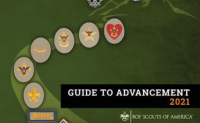 Talking with the Cubmaster at a Blue & Gold banquet recently, I found out that her son is crossing into Boy Scouts this spring. In fact, he (and she) have already been on a campout of the troop that he is joining. Among other tales of the adventure that lies across the bridge, I gently advised her to quell the urge to do things that the boys should be doing. She had heard that before – from the Scoutmaster. On the campout, she thought it would be helpful if she’d wipe down the table after the patrol had lunch, whereupon the Scoutmaster reminded her that it was the boys’ job to do that – not the adults’. So she called her son over and told him to do it, and learned the next part – it’s not the adults’ job to direct the Scouts, but that they’re led by their own leaders.
Talking with the Cubmaster at a Blue & Gold banquet recently, I found out that her son is crossing into Boy Scouts this spring. In fact, he (and she) have already been on a campout of the troop that he is joining. Among other tales of the adventure that lies across the bridge, I gently advised her to quell the urge to do things that the boys should be doing. She had heard that before – from the Scoutmaster. On the campout, she thought it would be helpful if she’d wipe down the table after the patrol had lunch, whereupon the Scoutmaster reminded her that it was the boys’ job to do that – not the adults’. So she called her son over and told him to do it, and learned the next part – it’s not the adults’ job to direct the Scouts, but that they’re led by their own leaders.
There’s a lot to learn when an adult follows his or her son into a troop. The things we cling to as we cross from Cub Scouting have to be let go. It’s a difficult transition – as I told her, she can go camping, but camp with the adults (not with her son), resist the urge to jump in and fix things, and just watch her son from a distance. That’s one of the greatest things about Boy Scouting, I told her – watching your son grow and develop, learn to do things, help each other and lead others, hopefully without realizing you’re watching.
It can likewise be a difficult transition for a Cub Scout leader who takes up a volunteer role in the troop. Used to being in charge of a den or pack program, a den leader or Cubmaster might think it’s his or her responsibility to run things in the troop, too – to make sure that troop meetings have activities and go smoothly, teach skills, set up tents, or to otherwise “help” the Scouts. It takes not only training and guidance from experienced leaders, but sometimes frequent reminders to change specific behaviors that have become habitual over the last several years.
Key to moving forward as your son moves ahead in maturity and capability is letting go. We naturally hold on to the things we’ve learned, or the things we feel we need to do as parents and Scout leaders. We hate to see our sons, or other young men, struggle or fail, but if we don’t let them experience difficulty for themselves, the opportunities for learning and personal growth are much more difficult to realize. This act of letting go is not just part of Scouting – it’s part of life and of growing up in general, and far too few parents understand this.
In his Soul to Work blog, leadership author Scott Mabry explains this very well. He tells us that the more we hold on to our old expectations, the more anxiety results and the more frustration ensues. It’s because, as leaders, we have become accustomed to being responsible for our portion of the Scouting experience, and we feel that we have failed if things go wrong. Now certainly we can’t just stand back and let a patrol or the troop flail about aimlessly, but neither is it our responsibility to do it for them. Our job goes from providing the program for the Scouts to providing them with the tools to spin their own program. It’s helping them discover for themselves which way to go, not pointing them in the direction we think is right. We have to let go of the way we did things before, as well as the idea that our reputation is staked on whether we have a snappy troop.
Mabry points out that when we let go of our notions of the way we used to do things, we free ourselves to enjoy the progress that those we lead are making on their own:
We can practice leadership and continue to learn with the freedom of knowing that none of this was ever really ours to possess.
As an adult leader in the Boy Scout program, let go of the idea that the program is your responsibility, and help your fellow leaders and parents of your Scouts see it too. It may be counterintuitive, but unless you let go you’ll never free your son and his friends to enjoy the thrill of success on their own.
Image: Serge Bertasius Photography / freedigitalphotos.net
This post first appeared on Bobwhite Blather.



